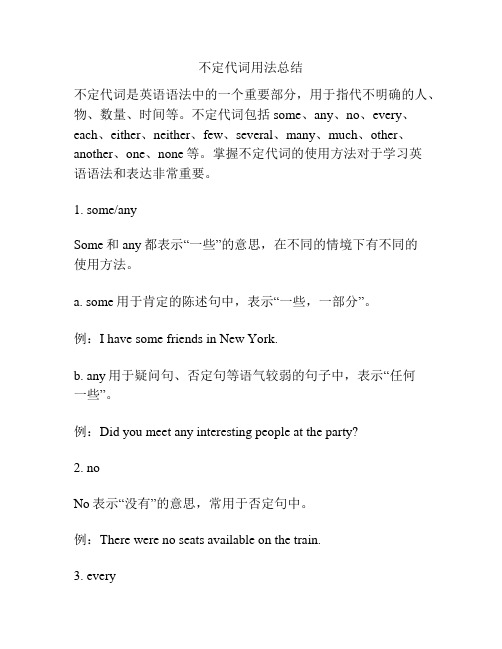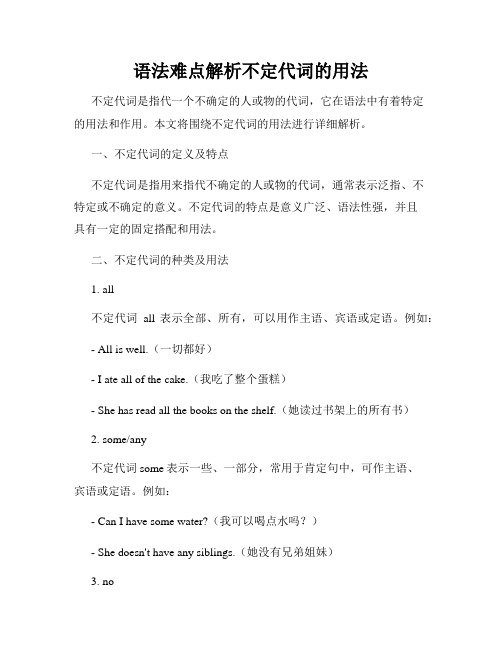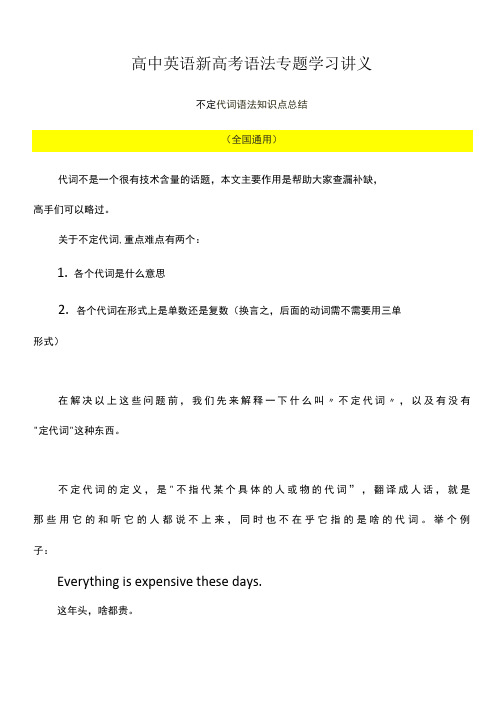高中英语 难点讲解 不定代词的固定表达
不定代词及用法

不定代词及用法不定代词及用法汇总为了方便考生们更好地复习总结英语词汇,小编在这里整理了英语词汇之不定代词及用法汇总,供考生们学习,希望能对考生们有帮助!1.不定代词概述不明确指代某个(些)人、某个(些)事物的代词叫不定代词。
不定代词可以代替名词和形容词,表示不同的数量概念。
不定代词没有主格和宾格之分,在句中可作主语、宾语、表语、定语等。
但不定代词none和some,any,no,every含有的复合不定代词something,anything,nothing,everybody等词只能在句子中作主语、宾语或表语,不能作定语。
而every,no在句子中只能作定语不定代词的分类如下所示:普通不定代词:some,any,no, somebody,anybody,nobody, someone,anyone,no one(或no-one), something,anything,nothing, one,none个体不定代词: every,each,other,another,either,neither,half, everybody,everyone,everything数量不定代词: all,both,many,much,few,little,a few,a little,a lot of,lots of,a great deal,a great many,other,others,another,the other2.不定代词的用法(1)all和both的用法①all 和both均可表示“全部都”, all指三个或三个以上的人或物,both仅指两个人或物。
all of/both of后为名词时,of可省略,但为宾格代词时不可省略。
All (of) the students went to the concert last night.昨晚所有的学生都听音乐会去了。
Both (of) my parents are non-smokers.我父母都不抽烟。
不定代词用法总结

不定代词用法总结不定代词是英语语法中的一个重要部分,用于指代不明确的人、物、数量、时间等。
不定代词包括some、any、no、every、each、either、neither、few、several、many、much、other、another、one、none等。
掌握不定代词的使用方法对于学习英语语法和表达非常重要。
1. some/anySome和any都表示“一些”的意思,在不同的情境下有不同的使用方法。
a. some用于肯定的陈述句中,表示“一些,一部分”。
例:I have some friends in New York.b. any用于疑问句、否定句等语气较弱的句子中,表示“任何一些”。
例:Did you meet any interesting people at the party?2. noNo表示“没有”的意思,常用于否定句中。
例:There were no seats available on the train.3. everyEvery表示“每一个”的意思。
例:Every student is required to attend the meeting.4. eachEach表示“每一个”,用于强调个体。
例:Each student is responsible for his or her own progress.5. either/neitherEither表示“两者中的任何一个”,neither表示“两者都不”。
例:You can choose either the blue or the red dress.例:Neither of us likes to cook.6. few/several/many/much这些代词都用于表示数量或程度。
a. few表示“很少,几乎没有”。
例:There were few people in the park on such a hot day.b. several表示“几个,若干”。
高考英语语法不定代词讲解

高考英语语法不定代词讲解以下是网给大家准备的高考英语语法不定代词讲解,欢送浏览。
The indefinite pronouns are:不定代词有:We use indefinite pronouns to refer to people or things without saying exactly who or what they are. We use pronouns ending in -body or -one for people, and pronouns ending in -thing for things:在描述不确定的人或物时,我们用不定代词来指代。
在指人时用代词接-body 或 -one,指物时用代词接-thing。
Everybody enjoyed the concert.I opened the door but there was no one at home.It was a very clear day. We could see everything.We use a singular verb after an indefinite pronoun:不定代词后用动词单数。
Everybody loves Sally.Everything was ready for the party.When we refer back to an indefinite pronoun we normally use a plural pronoun:当我们提及到不定代词时,通常也会用复数名词:Everybody enjoyed the concert. They stood up and clapped.I will tell somebody that dinner is ready. They have been waiting a long time.We can add -'s to an indefinite pronoun to make a possessive.我们能在不定代词后加-'s变成所有格。
语法难点解析不定代词的用法

语法难点解析不定代词的用法不定代词是指代一个不确定的人或物的代词,它在语法中有着特定的用法和作用。
本文将围绕不定代词的用法进行详细解析。
一、不定代词的定义及特点不定代词是指用来指代不确定的人或物的代词,通常表示泛指、不特定或不确定的意义。
不定代词的特点是意义广泛、语法性强,并且具有一定的固定搭配和用法。
二、不定代词的种类及用法1. all不定代词all表示全部、所有,可以用作主语、宾语或定语。
例如:- All is well.(一切都好)- I ate all of the cake.(我吃了整个蛋糕)- She has read all the books on the shelf.(她读过书架上的所有书)2. some/any不定代词some表示一些、一部分,常用于肯定句中,可作主语、宾语或定语。
例如:- Can I have some water?(我可以喝点水吗?)- She doesn't have any siblings.(她没有兄弟姐妹)3. no不定代词no表示没有、毫无,常用于否定句中,可以用作主语、宾语或定语。
例如:- No one is perfect.(没有人是完美的)- I have no money.(我一分钱也没有)4. each不定代词each表示每一个,用于三者或三者以上的指代,可作主语、宾语或定语。
例如:- Each has a different opinion.(每个人都有不同的意见)- They each brought a gift.(他们每个人都带了礼物)5. either不定代词either表示两者中任意一个,可作主语、宾语或定语。
例如:- You can choose either.(你可以选择任意一个)- I don't like either of them.(我都不喜欢)6. neither不定代词neither表示两者都不,可作主语、宾语或定语。
不定代词语法知识点总结讲义- 高三英语一轮复习语法专题

高中英语新高考语法专题学习讲义不定代词语法知识点总结代词不是一个很有技术含量的话题,本文主要作用是帮助大家查漏补缺,高手们可以略过。
关于不定代词,重点难点有两个:1.各个代词是什么意思2.各个代词在形式上是单数还是复数(换言之,后面的动词需不需要用三单形式)在解决以上这些问题前,我们先来解释一下什么叫〃不定代词〃,以及有没有"定代词"这种东西。
不定代词的定义,是"不指代某个具体的人或物的代词”,翻译成人话,就是那些用它的和听它的人都说不上来,同时也不在乎它指的是啥的代词。
举个例子:Everything is expensive these days.这年头,啥都贵。
你想想,这个''啥",指的是啥?没人知道。
说这句话的人也说不上来,听这句话的人也说不上来,并且也没人在乎。
这就是所谓的"不指代某个具体的人或物"。
那有没有"指代某个具体的人或物”的代词呢?有。
看下面的例子:She likes gossip way too much.她太喜欢八卦了。
这句话中的"她"就是一个"指代某个具体的人或物”的代词。
你可能会有疑问一一误不对啊,从这句话里我们好像并看不出来所谓的"她"指的是谁啊?没错,但是注意,并不是你不知道指代对象是谁的代词就叫不定代词,而是讲话的人和听话的人不知道,而且同时也不在乎指代对象是谁的代词,才是不定代词。
你想想,在现实世界中,如果张三跟李四讲了这句话,是不是肯定是在有上下文的语境里才说得出来?比如这样:"王麻子刚跟我打了通电话,扯了整整一个钟头她小舅子的事儿。
我的天呐,她太喜欢八卦了!”现在,"她''的指代对象是不是就很明确了?总而言之,虽然把那个小短句单独拎出来后我们确实无法判断"她”的指代对象是谁,但这并不意味着讲话的任何听话的人无法判断,或不在乎。
高考英语考点 12不定代词

考点十二不定代词1. both, either, neither, , all, none, no one, nobody● both表示“两个人或物都”,具有肯定含义;either表示“两者中的任何一个”,与否定词连用,表示对两者的全部否定;neither表示“两者都不”,其后可接of短语● all表示“全部”,指三者或三者以上的人或物;all也可笼统地表示“一切,所有”;none表示“三者或三者以上的人或物的全部否定”,在与of连用或回答how many/much的提问时只能用none;no one=nobody表示“没有一个人”,其后均不可接of短语,常用来回答who引导的问句。
☞Both of my parents are doctors.我的父母都是医生。
☞All of the students are interested in it.所有的学生对此都很感兴趣。
☞He has two sons, neither of whom is rich.他有两个儿子,都不富有。
☞He has three sons, none of whom is rich.他有三个儿子,都不富有。
2. 不定代词some与any的用法在通常情况下,some要用于肯定句,在否定句或疑问句中,一般用any代替。
但是,这只是一般情况。
在某些特殊情况下,some也可用于疑问句和否定句。
(1)some用于疑问句:一是用于可预料答语为“是”的问句中,二是用于表示请求或建议的疑问句。
如:☞Did some of you sleep on the floor? 你们有人睡在了地板上吗?☞Would you like some more fruit? 你要不要再吃点水果?(2)some用于否定句:Some用于否定句主要见于以下情形:☞用于部分否定的句子中。
比较:I do not like any of the films. 这些电影中我一部也不喜欢。
高中英语语法之代词:不定代词的用法
高中英语语法之代词:不定代词的用法常见的不定代词有 all, both, each, every, some, any, many, much, (a)few, (a)little, one, ones, either, neither, other, another, no,none 以及含有 some, any, no等的合成代词(如:anybody, something, no one)。
这些不定代词大多可以代替名词,在句子中作主语、宾语、表语或定语。
但 none 和由 some, any, no,every 构成的复合不定代词(如 somebody 等)只能作主语、宾语和表语。
every和no只能作定语。
1、不定代词可作主语。
当作主语时,要明确这一不定代词到底是单数还是复数,以确定它和谓语动词在人和数的全都。
2、不定代词还可作定语。
当作定语时,应当留意其所修饰的名词是可数还是不行数,以确定这个名词用单数还是复数。
例:Much has been done to fight pollution;each of them has got a present.3、many,few 和both用于可数名词,表示复数概念。
4、All,both和each 和含有every的复合代词用在否认句中只表示部分否认。
例:Not all the students have been to the Austrlia.She can’t work out both of the difficult problems.Everybody cannot work out the problem.5、Neither,none和含有no的复合代词表示全部否认。
例:None of us can answer the question. Neither of the questions is right.历届高考试题分析例 1、No progress was made in the trade talk as neither side would accept the conditions of ____.A. othersB. the otherC. eitherD. another答案:B 【解析】依据上文 neither 的提示可以看出所指的应当是两者中的另外一个,所以用the other。
英语语法 什么是不定代词
英语语法什么是不定代词英语语法不定代词是指用来替代特定或具体名词的代词,但不指代具体的人、事、物或数量的词语。
不定代词通常用于表示不确定、泛指或不特定的情况。
在英语中,有许多不定代词用于替代特定的名词,每个不定代词都有自己的语法规则和用法。
以下是一些常见的不定代词及其用法的详细解释。
1. Some/Any- Some用于肯定句中,表示某个或一些。
- Any用于否定句和疑问句中,表示任何或一些。
例句:- I have some books on the shelf.(我书架上有一些书。
)- I don't have any apples.(我没有任何苹果。
)- Do you have any questions?(你有任何问题吗?)2. All/None/Both- All表示全部或所有。
- None表示没有任何。
- Both表示两个都。
例句:- All students must attend the meeting.(所有学生都必须参加会议。
)- None of the food is left.(没有任何食物剩下了。
)- Both options are good.(两个选项都不错。
)3. Each/Every- Each表示每一个,强调个体。
- Every表示每一个,强调整体。
例句:- Each student should bring their own pen.(每个学生都应该带自己的笔。
)- Every student must pass the exam.(每个学生都必须通过考试。
)4. Somebody/Anybody/Nobody/Everybody- Somebody表示某人。
- Anybody表示任何人。
- Nobody表示没有任何人。
- Everybody表示每个人。
例句:- Somebody called you earlier.(有人给你打电话了。
)- Did anybody see what happened?(有人看到发生了什么吗?)- Nobody knows the answer.(没有人知道答案。
(完整版)不定代词用法讲解
不定代词讲解~详细一、不定代词some 与any 的用法区别一般说来,不定代词some 用于肯定句中,any 用于否定句和疑问句中。
但是,在表示请求、邀请或征求意见的句子中,通常要用some 而不用any:Would you like some cake? 吃点蛋糕吗?Why not buy some bread? 为什么不买些面包呢?Shall I get some chalk for you? 要我帮你拿些粉笔来吗?【说明】不定代词any 有时也用于肯定句中,此时表示“任何”:Any colour will do. 任何颜色都行。
Come any day you like. 随便哪天来都可以。
二、不定代词many 与much 的用法以及区别不定代词many 和much 都表示“许多”,但many 修饰或代替可数名词(复数),与few(少数)相对;而much 用来修饰或代替不可数名词(单数),与little(少量)相对。
在口语中两者主要用于非肯定句中:Did you see many people there? 你在那儿看见许多人了吗?We don’t have much time. 我们没有许多时间。
Much work has been done. 许多工作都已经做了。
You’ve given me too much. 你已给我太多了。
Take as many (much) as you want. 你要多少拿多少。
I asked her a great many questions. 我问了她许多问题。
辨析:too much;much too;too many1、too much常用作副词或代词,也可以用作形容词修饰不可数名词.如:Is watching TV too much good or bad for your health?电视看得太多对你的健康有益还是有害?You've given me too much.你给我的太多了.We've had too much rain lately.最近我们这里的雨下得太多了.2、much too常作副词,后接副词或形容词.如:He drove much too fast.他开车开得太快了.It is much too cold.天实在太冷了.3、too many常用作形容词,修饰可数名词复数.如:They built too many buildings last year.去年他们建了许多楼房.三、either、neither的用法以及区别1、用作副词。
高考英语语法知识梳理-----不定代词的用法
高考英语语法知识梳理••不定代词的用法不定代词一、不定代词的分类一、不定代词的分类1.根据用法分类(1)表示两者:both, either, neither(2)表示全部:all, any, none, every(3)表示部分:one, another, each, some, several, little/few,many/much, other, most(4)表示单数:either, each, one,复合不定代词(5)表示单数和复数:other, another(6)表示可数:every, each, one, another, either, neither, both, many, few(7)表示不可数:little, much, something, anything, nothing, everying(8)表示可数和不可数:all, any, some, most, none, other, no(9)表刁;全部否定:none, neither, nobody, nothing(10)只表示限定:every, no.复合不定代词(1)根据形式分类(2)根据用法分类不定代词二、不定代词的句法作用二、不定代词的句法作用1.作主语Everything goes well!万事如意!Either of the answers is correct,两个回答不论哪一个都对。
Neither of the answers is correct.两个回答哪一个都不对。
Is everybody here?大家都到了吗?2 .作宾语(1)动词宾语I like none of the books.这些书我全不喜欢。
If you have any, give us some.有的话,给我们一点。
We admire all of you.我们钦佩你们大家。
(2)介词宾语There is room for all of us.我们所有的人全坐得下。
- 1、下载文档前请自行甄别文档内容的完整性,平台不提供额外的编辑、内容补充、找答案等附加服务。
- 2、"仅部分预览"的文档,不可在线预览部分如存在完整性等问题,可反馈申请退款(可完整预览的文档不适用该条件!)。
- 3、如文档侵犯您的权益,请联系客服反馈,我们会尽快为您处理(人工客服工作时间:9:00-18:30)。
难点 3 不定代词的固定表达不定代词具有名词和形容词的性质,并有可数与不可数、单数与复数的区别,用时需慎重。
●难点磁场1.(★★★★)—Is________here?—No,Bob and Tim have asked for leave.A.anybodyB.somebodyC.everybodyD.nobody2.(★★★★)They were very tired,but________of them would stop to take a rest.A.anyB.someC.noneD.neither3.(★★★★)I hope there are enough glasses for each guest to have________.A.itB.thoseC.themD.one4.(★★★★★)—When shall we meet again?—Make it ________day you like;it’s all the same t o me.A.oneB.anyC.anotherD.some5.(★★★★★)I agree with most of what you said,but I don’t agree with________.A.everythingB.anythingC.somethingD.nothing(NMET1997)6.(★★★★★)Sarah has read lots of stories by American writers.Now she would like to read________stories by writers from________countries.A.some;anyB.other;someC.some;otherD.other;other7.(★★★★)—Can you come on Monday or Tuesday?—I’m afraid________day is possible.A.eitherB.neitherC.someD.any8.(★★★★★)Dr.Black comes from either Oxford or Cambridge,I can’t remember________.A.whereB.thereC.whichD.that9.(★★★★★)—Are the new rules working?—Yes.________books are stolen.A.FewB.MoreC.SomeD.None10.(★★★★)Few pleasures can equal________of a cool drink on a hot day.A.someB.anyC.thatD.those●案例探究1.If you want to change for a double room,you’ll have to pay________$15.A.anotherB.otherC.moreD.each(NMET2000)命题意图:本题考查学生对“又”“再”的英语表达方式的掌握,属五星级题目。
知识依托:“another+数词+复数可数名词”表示在原有基础上多出的数量。
错解分析:B、C迷惑性较大。
因other、more也有“再”“又”之意,但位置与another 不同。
解题方法与技巧:必须记清表达方式,数词+more/other+复数可数名词。
答案:A例:I’ve got another three books.I’ve got three more/other books.2.—Why don’t we take a little br eak?—Didn’t we just have________?A.itB.thatC.oneD.this(NMET2000)命题意图:考查学生对表示特指事物的代词和表示泛指事物的代词的区别,属四星级题目。
知识依托:one代替单数可数名词,但泛指物。
错解分析:A项选择迷惑性较大。
因人称代词it和不定代词one都可以代替单数可数名词,但it指特定事物。
解题方法与技巧:答语中用one泛指第一个对话者询问的a little break。
答案:C●锦囊妙计不定代词的种类较多,用法各异,下面分别进行介绍。
1.one,some与any的用法one可以泛指任何人,还可以在形容词和that、this等词后代替刚提过的可数名词,其复数形式为ones,可用作主语和宾语;one’s是它的物主代词形式,可用作宾语;oneself 是它的反身代词形式,可用作宾语。
some和any通常用作定语,都可用来修饰可数与不可数名词、单数或复数名词。
some用于单数可数名词前,表示“某一”。
some用于数词前,表示“大约”。
some一般用于肯定句,any多用于疑问、否定句中。
例如:One should wash oneself regularly.This film is not as good as the one I saw yesterday.He thought it over carefully and concluded that heavy objects always fell faster than light ones.We have some food left.Have you any books?I don’t have any books.注意:①some可用于表达邀请或请求、预期的答案是肯定的或鼓励对方给予一个肯定的答复的问句。
例如:Could you let me have some coffee?(请求)Would you like some bananas?(邀请)②some和any可用作主语和宾语。
例如:Some are singing,others are dancing.(主语)Does any of you know Mr Wang?(主语)I don’t like any of the books。
(宾语)③some,any,every,no与one,body,thing构成的合成代词都作单数看待。
另外,some的合成代词一般用于肯定句,any的合成代词一般用于否定句、疑问句和条件从句。
例如:Did anybody ask for you outside?There is somebody waiting for you.2.each,every的用法①each强调个体,可以充当宾语、定语、主语和同位语,every强调整体,相当于汉语的“每个都”,在句中只作定语。
例如:The teacher had a talk with each of them.(宾语)Each of us has two boxes.(主语)We have two boxes each.(同位语)Each boy has a bike.(定语)Every one has strong and weak points.(定语)② each所代表的数可以是两个或两个以上,而every所指的数必须是三个以上。
例如: Each of the two has won a prize.Every student in the class likes English.There is a line of trees on each side of the river.3.none和no的用法:①no=no any在句中作定语,修饰可数或不数名词。
none在句中作主语或宾语。
none 不能用来说明两个人或物。
例如:There is no water in the well(井).(定语)None of them know the story.(主语)I know none of them.(宾语)②none代替不可数名词作主语时,谓语动词用单数形式;代替可数名词作主语时,谓语动词可用单数,也可用复数。
例如:None of the students are(is)afraid of difficulties。
③none不能回答who的问题,可回答how many或how much的问题,例如:(误)—Who is in the classroom?—None.(改None为No one或Nobody)(正)—How many students are there in the classroom?—None.4.many和much的用法many和much都表示“许多”, many修饰可数名词,much修饰不可数名词,都可用作主语、宾语和定语。
例如:Many of the students often go shopping.(主语)I have much to do.(宾语)There is not much water in the cup.(定语)much有时用作状语,例如:He likes playing football very much。
(状语)5.few,little;a few,a little的用法①few和little表示没有多少,含否定意义;而a few与a little表示有一些,有几个,含肯定意义。
另外,few与a few修饰可数名词,而little与a little修饰不可数名词,它们在句中常用作定语、主语和宾语。
例如:He knows a little English.(定语)He has many books.But few are interesting.(主语)I know a little about Japanese(宾语)②a few,a little可以用quite或only修饰,few和 little则不能。
例如:—How much water is left?—Only a little./Qutie a little.—How many books are left?—Only a few./Quite a few.6.other和 anotherother泛指“另外的”,作定语,常与复数名词或单数不可数名词连用,但如果前面有the,this,that,some,any,each,every,no,none,one,or以及形容词性物主代词时,则可与单数名词连用。
例如:all other rice,no other way,the other one,any other plant,every other day,some other reason等等。
others是other的复数形式,泛指“别的人或物”(但不是全部)。
